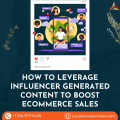What is Influencer Marketing?
Influencer marketing refers to a marketing approach that involves partnering with individuals who have a significant following on social media platforms. Influencers are typically people who have built a strong online presence and have developed a loyal following of fans who trust their opinions and recommendations.
When a business partners with an influencer, the influencer promotes the business’s products or services to their followers. This can include posting photos or videos of the products, writing reviews, or sharing discount codes. By leveraging the influencer’s audience, businesses can reach new potential customers and drive sales.
Why is Influencer Marketing Effective for E-commerce?
Influencer marketing is effective for e-commerce businesses for several reasons:
Trust: Influencers have built a strong level of trust with their followers. By partnering with an influencer, businesses can tap into that trust and gain credibility with potential customers.
Reach: Influencers have large followings on social media platforms like Instagram, YouTube, and TikTok. By partnering with an influencer, businesses can reach a wider audience than they could with traditional marketing methods.
Engagement: Influencers are experts at creating engaging content that resonates with their followers. By partnering with an influencer, businesses can create engaging content that helps build brand awareness and drive sales.
Authenticity: Influencers are known for their authenticity and honesty. By partnering with an influencer, businesses can showcase their products in a natural and authentic way that resonates with potential customers.
How to Start Influencer Marketing
Here are the steps to get started with influencer marketing for your e-commerce business:
Define Your Goals: Before you start reaching out to influencers, define your goals for the campaign. Would you like to enhance your sales figures, attract more visitors to your website, or establish greater brand recognition? Knowing your goals will help you choose the right influencers to partner with and measure the success of the campaign.
Identify Influencers: Once you’ve defined your goals, it’s time to identify influencers to partner with. Especially, Search for influencers whose values resonate with your brand’s values and who have a following that aligns with your target audience.
Reach Out to Influencers: Once you identify potential influencers, reach out to them with a proposal for the campaign. Be sure to explain why you think they are a good fit for your brand and how you can collaborate.
Create a Campaign: Work with the influencer to create a campaign that aligns with your goals and resonates with their audience. Ensure that the influencer has the liberty to exercise their creativity. Also, ensure to include your brand’s message in the content.
Leverage User-Generated Content: Encourage your influencer partners to create user-generated content (UGC) that showcases your products or services. User-generated content (UGC) has the potential to establish brand credibility and increase customer engagement.
Consider Long-Term Partnerships: Instead of working with influencers on a one-off basis, consider building long-term partnerships. This can help build a deeper relationship with the influencer and their audience, leading to greater brand loyalty and sales over time.
Types of Influencers:
When it comes to influencer marketing, there are several types of influencers to choose from. Here are some of the most common types:
Mega-Influencers: Mega-influencers are those with more than one million followers. They typically have a broad reach and can be effective for increasing brand awareness.
Macro-Influencers: Macro-influencers have between 100,000 and one million followers. They have a smaller reach than mega-influencers, but they tend to have more engaged audiences and can be more cost-effective for smaller e-commerce businesses.
Micro-Influencers: As mentioned before, micro-influencers have between 1,000 and 100,000 followers. They tend to have highly engaged audiences and can be an excellent choice for businesses looking to build trust with their target audience.
Nano-Influencers: Nano-influencers are those with fewer than 1,000 followers. They may not have a massive reach, but they tend to have highly engaged audiences and can be effective for building brand trust.
Celebrity Influencers: Celebrity influencers are famous people outside of social media who have a large following on social media platforms. They can be effective for increasing brand awareness, but they can also be expensive to partner with.
Industry Experts: Industry experts are influencers who are experts in a particular industry. They may not have a massive following, but they have a high level of authority and can be effective for building trust with their target audience.
When choosing an influencer to partner with, it’s essential to consider the type of influencer that aligns with your brand’s values and goals. Also, consider their engagement rate, audience demographics, and previous partnerships to ensure they’re the right fit for your campaign.
Transparency is Key: Be transparent with your audience about your influencer partnerships. The Federal Trade Commission (FTC) requires influencers to disclose their sponsored content, so make sure your influencers are following the rules.
Don’t Put All Your Eggs in One Basket: Instead of relying on a single influencer, consider working with several influencers at once. This can help diversify your audience reach and reduce the risk of the campaign not resonating with the audience.
Track and Measure Results: After the campaign is launched, track and measure the results. Use tools like Google Analytics to track website traffic and sales, and monitor social media engagement to see how the campaign is resonating with the audience.
Final Thoughts on Influencer Marketing for eCommerce
Influencer marketing can be a powerful tool for e-commerce businesses looking to reach new potential customers and drive sales. By partnering with influencers, businesses can tap into their large followings and build trust with their target audience. To run a successful influencer marketing campaign, businesses should choose the right influencer, set clear goals, give creative freedom, be transparent, and track and measure results. Following these steps, eCommerce businesses can optimize their influencer marketing campaigns and drive even greater success.
Stand out from the herd withPurple Cow. Elevate your influencer marketing game and achieve e-commerce success with our expert tips and strategies. Learn how to leverage the power of social media influencers, increase engagement, and drive sales. Don’t blend in, be remarkable with Purple Cow.














